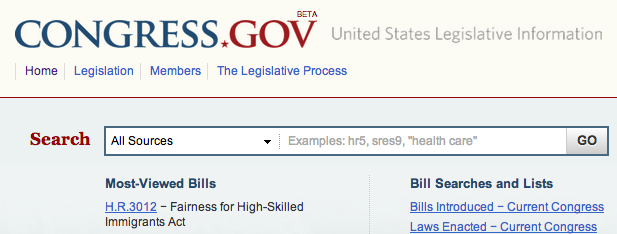The United States Congress’s website got an expensive new facelift this week, but access to its incredibly valuable data was conspicuously absent. Most citizens are unaware that Congress has its own internal $100 million research service that rivals Wikipedia in the breadth and quality of reports it produces on every imaginable policy issue. The Congressional Research Service, whose reports are available to citizens if they beg their representatives for a copy, has yet to give a clear justification why they’ve not opened their data to the public. “Another hilarious/clueless misallocation of resources. 1st liberate bulk #opengovdata; then open API; then website,” tweeted co-founder of OpenCongress.org, David Moore.
Moore, who was also commenting on the lack of access to legislative data necessary to track bills as they progress through Congress, is part of a cottage industry of civic hackers who attempt to make some of the data accessible to the public. OpenCRS.org, for example, releases a few of the nearly two dozen daily reports on its website. The quality of the reports speak for the themselves: a 56-page report released last June on Iranian sanctions [pdf] is easily one of the best pieces of research available anywhere on the Internet.
“For too long, C.R.S. reports have been available to the public only on a haphazard basis,” wrote Senator Joe Leiberman, who has twice introduced bills to liberate the research. “These reports inform members of Congress and their staffs on a wide range of issues. The American people, who pay for these reports, should be able to learn from this same expert analysis.”
So, why aren’t they available? One source close to the project tells TechCrunch that Congressmen exploit their exclusive access to seem generous to constituents. Having to go through one’s representative makes congressmen appear valuable.
Additionally, the reports also reveal what congress doesn’t know. For instance, in 2010, the CRS released a simple 5 page report [pdf] on the differences between Sunnis and Shiite muslims, something politicians making policy related to the Iraq War were notoriously ignorant of. The Islamic cliff-notes from CRS doesn’t shine a pretty picture on Congress’s foreign policy knowledge.
Lastly, Congressional insiders have been bickering over how, precisely, to release data. CRS reports are only one dataset, along with legislative text, subcommittee hearing notes, and other congressional information that must be published in a way that’s user-friendly. “Legislative data is tuf nut to crack,” tweeted Senator Harry Reid’s new media Director, Aaron Myers, to O’Reilly news writer, Alex Howard (Note: Howard’s Twitter feed is a great source for open-government news).
Logistics aside, there’s something shady about not releasing this valuable resource to the public.

